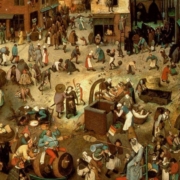Institutions and economic science: links between cognitive processes and the emergence of social rules
Abstract
Standard economic theory has long underestimated the role of institutions in economic systems and in the processes of change, focusing on equilibrium and the mechanisms that determine it spontaneously. Equilibrium, once achieved, is only interfered by external shocks (exogenous shocks) and it is not disturbed by dynamics developing within the system. Institutions, in this theoretical framework, are functional to achieve efficient outcomes but play no role in the process of economic change (North, 1990).
On the other hand, the heterodox approach to the economics, targeting the research into the processes by which institutions emerge and change, highlights their importance in social dynamics. Economics of institutions changes the focus of the analysis: it does not start from the study of the effects that given institutions can have on the economic systems, but it focuses on individual behavior and on the cognitive processes that determine it. This research field investigates the dynamics through which the interaction between agents determines the emergence of social institutions and how the latter are able to evolve and to graft changing processes in individuals.
This article aims to introduce the reader to this research area in which the links between mind and institutions become an essential element in the analysis of economic role institutions.




